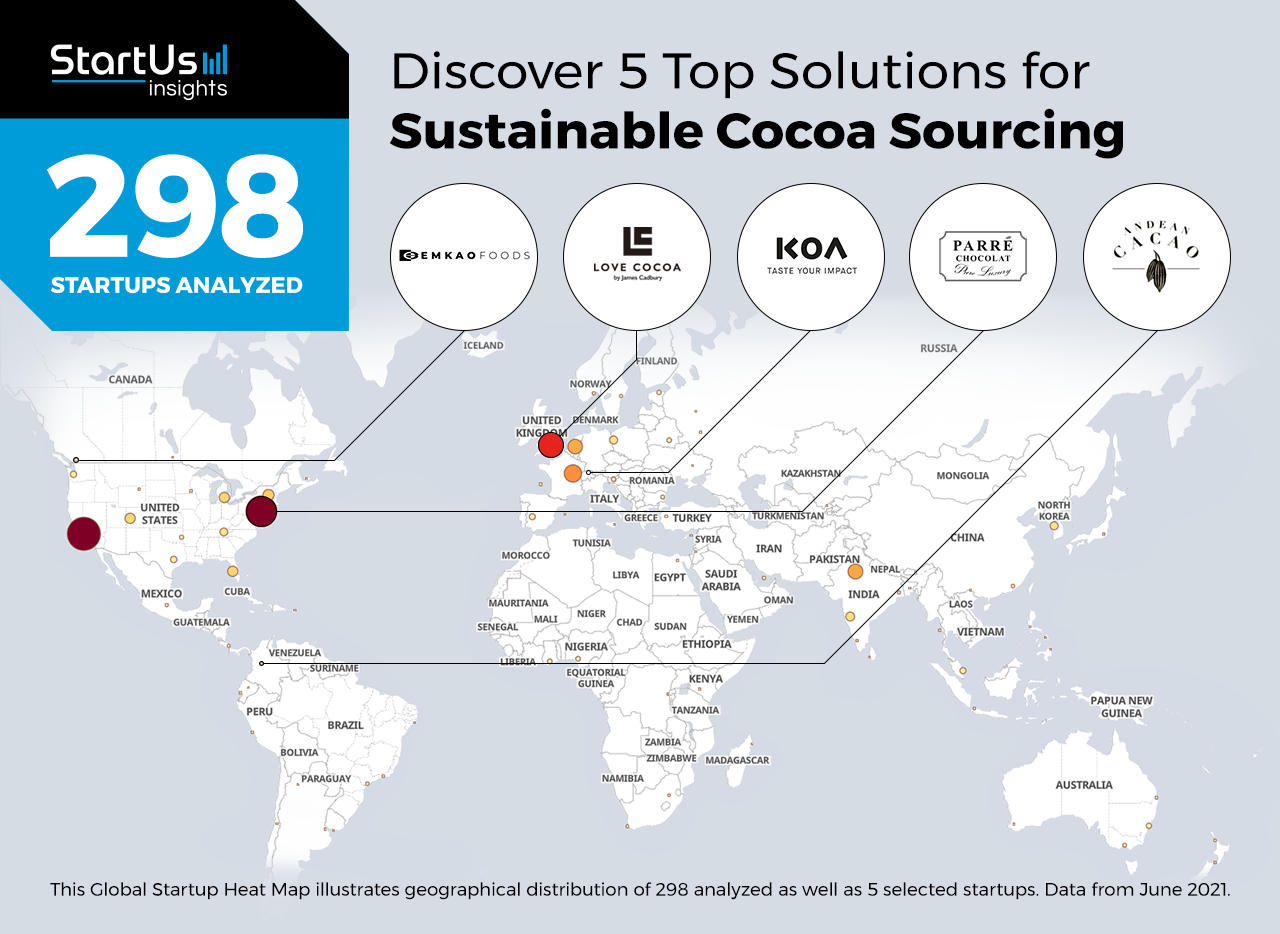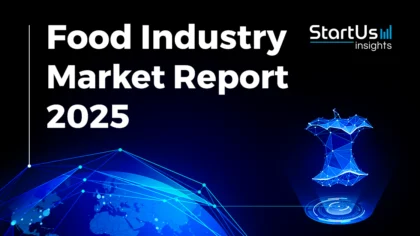Staying ahead of the technology curve means strengthening your competitive advantage. That is why we give you data-driven innovation insights into the food industry. This time, you get to discover 5 hand-picked sustainable cocoa sourcing solutions.
Global Startup Heat Map highlights 5 Top Sustainable Cocoa Sourcing Solutions out of 298
The insights of this data-driven analysis are derived from the Big Data & Artificial Intelligence-powered StartUs Insights Discovery Platform, covering 2.093.000+ startups & scaleups globally. The platform gives you an exhaustive overview of emerging technologies & relevant startups within a specific field in just a few clicks.
The Global Startup Heat Map below reveals the distribution of the 298 exemplary startups & scaleups we analyzed for this research. Further, it highlights 5 food tech startups that we hand-picked based on criteria such as founding year, location, funding raised, and more. You get to explore the solutions of these 5 startups & scaleups in this report. For insights on the other 293 sustainable cocoa sourcing solutions, get in touch.
EMKAO FOODS promotes Ethical Sourcing
Cocoa is a prominent fair trade crop that is mostly grown in African countries and because of its popularity, is exported across the world. However, such popularity of cocoa increases the potential for the exploitation of product sourcing. Both consumers and suppliers strive to ensure that downstream processes are transparent and fair. This is achieved through different strategies. For example, startups form international partnerships only with suppliers that have displayed fair trade practices.
Canadian startup EMKAO FOODS enables cocoa sourcing via sustainable fair trade partnerships. The startup trains farmers in agricultural conservation practices and ensures that cocoa is sourced with fair trade practices in mind. The startup partners with local cooperatives in Cameroon. It enters into contracts with farmers to aid in the overall economic development of the farming communities.
Parré Chocolat establishes Traceable Sourcing
Buyers and consumers are now more conscious of the source of the goods they buy. As a result, traceability solutions that enable more informed purchasing habits are on the rise. Besides establishing the quality of the item bought, traceability also ensures hygienic and non-exploitative practices in food production. By knowing the working conditions on the farm that produces the cocoa, buyers engage in conscientious consumption. One way in which startups ensure traceability is through sourcing cocoa from known and reputable farms.
US-based startup Parré Chocolat provides traceability in cocoa sourcing. Through a partnership with Uncommon Cacao, a global specialist in transparent trade, the startup sources high-quality cocoa beans. To maintain traceability of the product, Parré Chocolat obtains extensive knowledge of the farming practices maintained on each cocoa farm before entering into an agreement with the producer. The startup ensures pure, ethical trade practices that economically bolster farming communities.
Andean Cacao delivers Single-Origin Cocoa Beans
Although the term single origin is mostly associated with coffee, the rise of artisanal and specialty products spurred the trend of single-origin cocoa. Different varieties of cocoa are produced in different regions. Consequently, small farms play a major role in single-origin production. Maintaining quality and the strict discrepancy between varieties is crucial and small farms are more manageable to this end. Thus, single-origin sourcing promotes small farmers and ensures that the buyer gets quality-checked cocoa beans.
Colombian startup Andean Cacao sources single-origin cocoa beans. The startup uses a technology-focused approach to supply single-origin cocoa beans. It offers professional plantation development, optimized plantation design, personalized plant nutrition, and irrigation, and mechanized plantation maintenance, amongst others. This ensures consistent high-quality single-origin cocoa beans which can be used across the FMCG industry, in the form of cocoa butter, chocolate, and cocoa powder. The startup also provides formal employment in rural areas through their plantations.
Love Cocoa offers Sustainably Sourced Cocoa Beans
Usustainable farming practices are detrimental to the environment as well as lead to the decline of soil quality and yield over time. Overall sustainability across the supply chain is augmented by incorporating green practices in the sourcing of the product. For example, startups use biodegradable packaging to decrease the overall carbon footprint. Startups are incorporating sustainable practices throughout the food supply chain.
British startup Love Cocoa integrates sustainable practices into cocoa sourcing. It sustains organic farming in Ecuador, along with the renovation of plantations and post-harvest care. Young trees are planted to replace old or dying trees allowing farmers to improve the production and yields of their plantations while ensuring the cocoa is of high quality. The startup further ensures that all packaging is either compostable or recyclable.
Koa innovates Solar-powered Cocoa Processing
The utility of renewable technologies is especially pronounced in areas without access to grid power. Rural areas, which are primarily composed of agrarian communities and practices, often have limited electrification. Power is often required for cocoa beans processing, and the lack of electricity hampers the yield and speed of dispatch. Startups develop renewable energy solutions to solve these challenges. For example, solar power solutions enable the extraction and processing of cocoa pulp in remote regions.
Swiss startup Koa utilizes solar power to aid the processing of cocoa beans. The startup develops community mobile processing units (CMPUs), which enable the extraction of cocoa pulp in the center of the communities, next to the cocoa farms. Through renewable energy, it enables the processing of cocoa fruits even in remote areas. Solar power also enables immediate cooling of the fresh cocoa fruit products to improve their quality. Koa also promotes food safety through digital process monitoring in real-time at factories that process cocoa.
Discover more Food Startups
Food tech startups such as the examples highlighted in this report focus on food supply chains, food waste management, and food safety. While all of these technologies play a major role in advancing the food industry, they only represent the tip of the iceberg. To explore more food technologies, simply get in touch to let us look into your areas of interest. For a more general overview, you can download our free Food Tech Innovation Report to save your time and improve strategic decision-making.



![Food and Beverage Industry: Top 10 Technology Trends [2025 & Beyond]](https://www.startus-insights.com/wp-content/uploads/2024/11/Food-and-Beverage-Industry-Trends-SharedImg-StartUs-Insights-noresize-420x236.webp)






